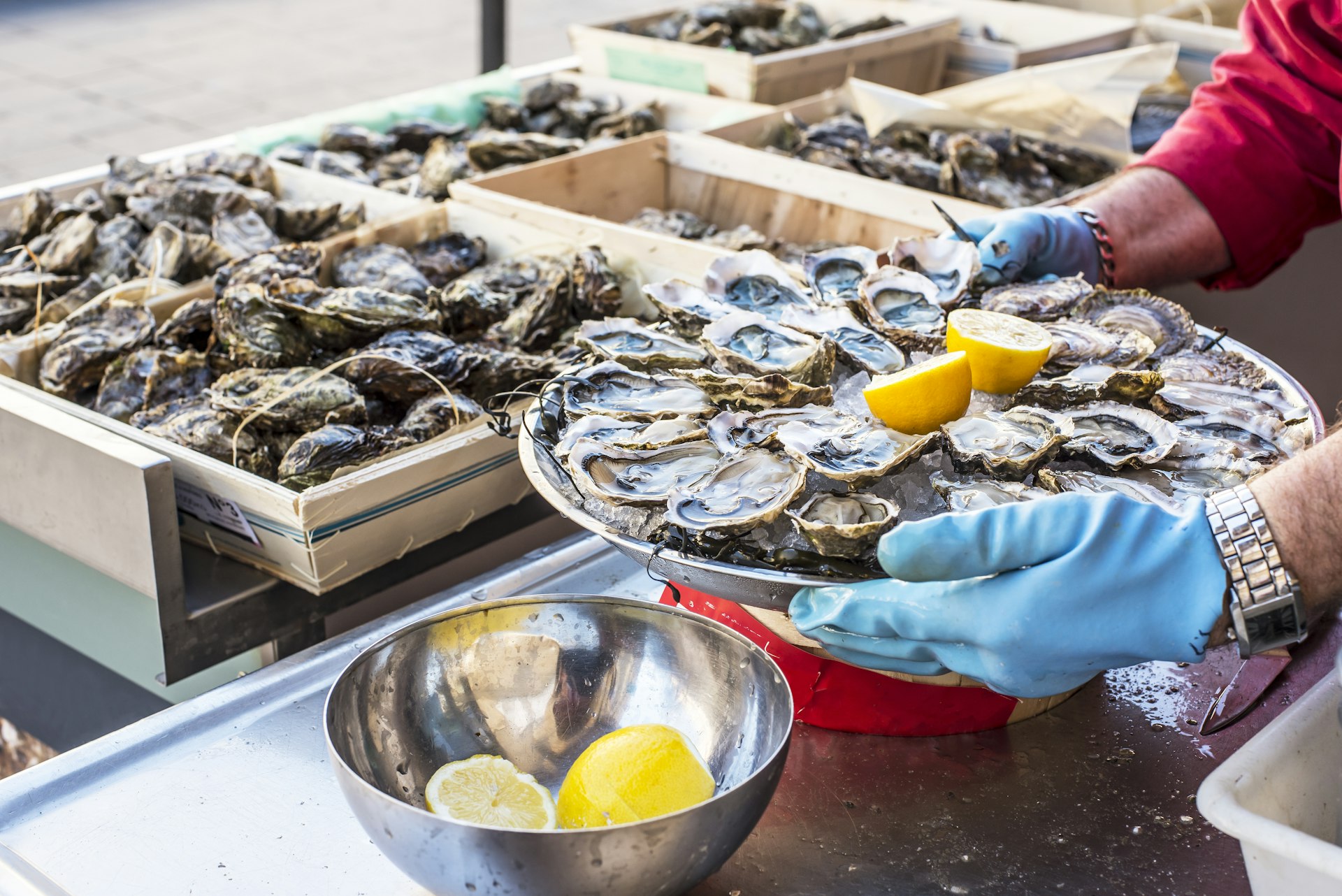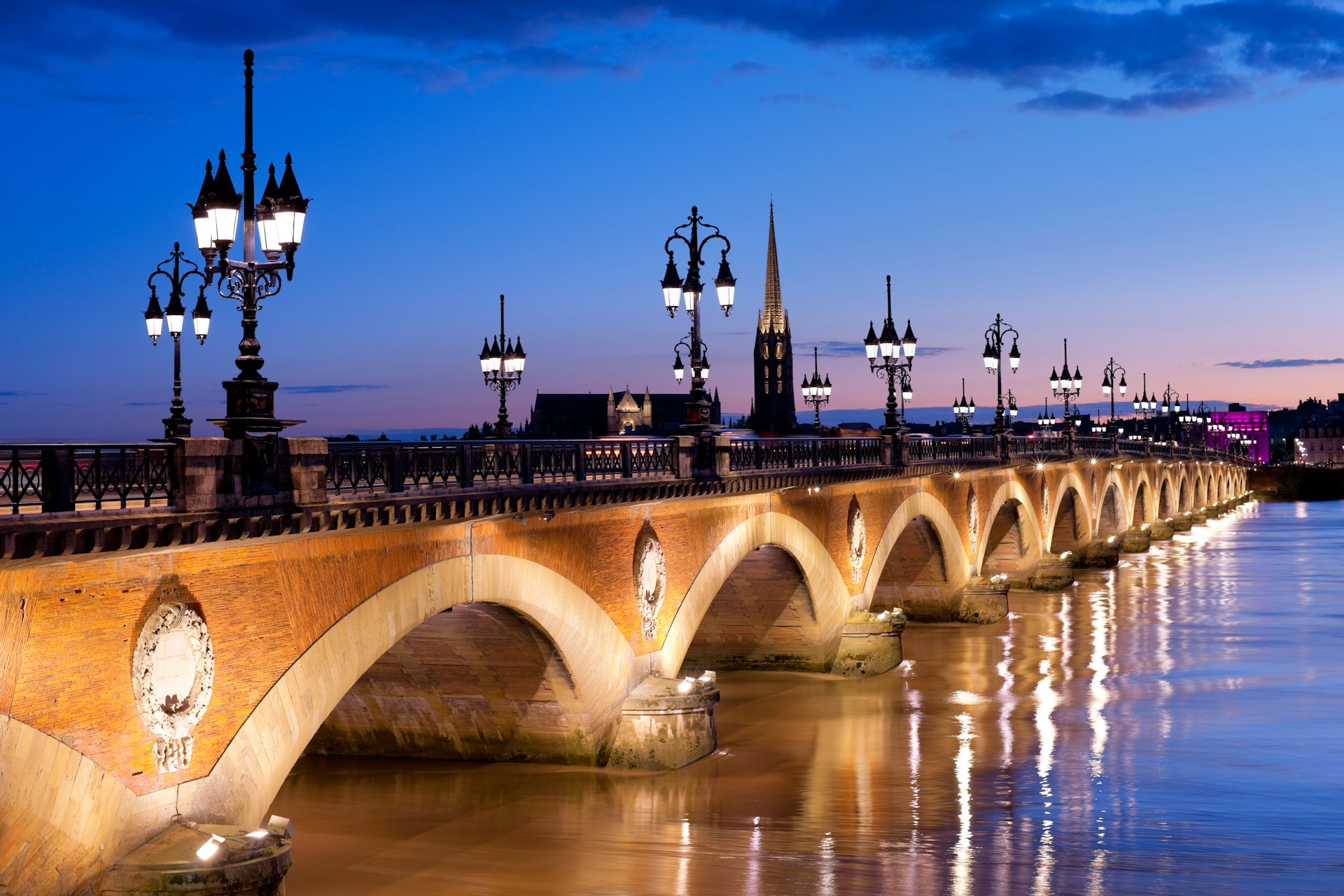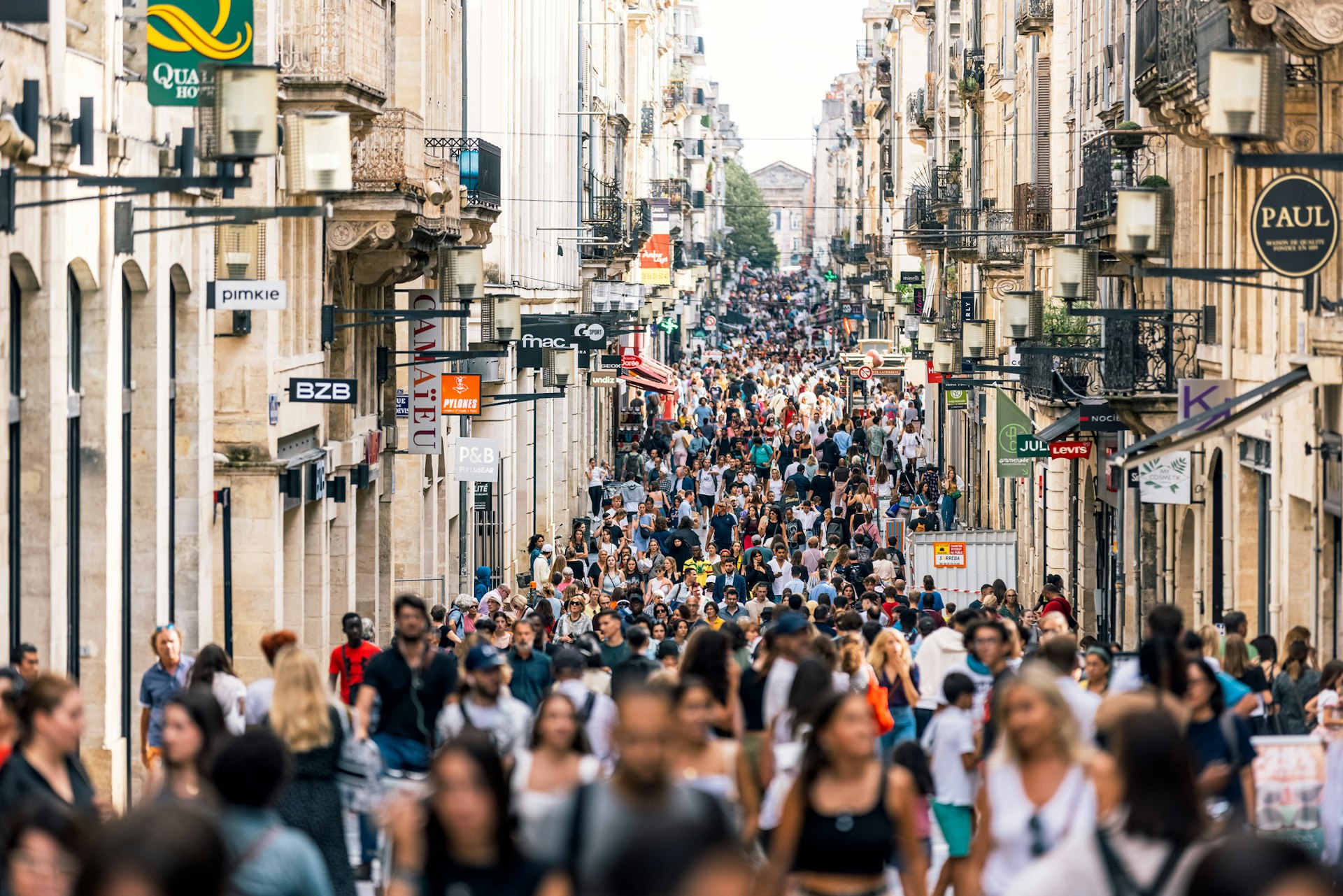A provincial city in southwest France that deserves your full attention, Bordeaux is catwalk material. Wide aristocratic boulevards lined with elegant townhouses and glitzy designer boutiques vie for center stage with a labyrinthine medieval old town, industrial-cool wet docks and an infinite sweep of silky-smooth riverside quays abuzz with cyclists, skaters, city slickers, dandies, flaneurs – you name it.
As France’s sixth-largest city, Bordeaux is compact and a breeze to navigate on foot and by public transport. Wherever you stay, it’s fast and hassle-free to move between neighborhoods. A weekend break ticks off the main sights, but to even begin to understand this ancient, prized port where the Romans planted vines and merchant ships laden with red wine, flour, silks and other local products set sail for far-flung lands in the 17th and 18th centuries, stay longer.
Here are the key neighborhoods to explore.
St-Pierre & St-Paul
Best neighborhood for cafe life and first-time sightseeing
Itching to explore the world’s largest urban UNESCO World Heritage site? Hit this central twinset – the medieval heart of Bordeaux where candlestick makers, goldsmiths, cabinet makers, coopers and other craftsmen plied their trade in the 13th century. Many of the narrow medieval streets are car-free: lounge over un café and croissant between sights on bijou, fountain-pierced squares framed by cafe terraces. On warm summer evenings, dine at restaurant tables filling lanes off Pl St-Pierre.
Bordeaux’ rich history unfolds before your very eyes in this touristy chunk of town. Take it all in with beady-eyed gargoyles atop the Gothic belltower of Cathédrale St-André. Then hike up city gate Porte Caihau (the original entrance to medieval Bordeaux) and across Pont de Pierre (1819–22) – the oldest bridge across the Garonne – to observe even more sans les crowds. Intersperse blockbuster history and art museums Musée d’Aquitaine and Musée des Beaux-Arts with mainstream shopping on pedestrianized, crowd-packed rue Ste-Catherine. Hot spots to slow down, stop and observe la vie bordelaise (Bordelais life): place de la Bourse, place de la Comédie and place du Palais.
Abundant hotels of all styles and price ranges pander to those happy to stay overnight in this noisy, action-packed drinking and dining district. Designer fashion shopping hot spot Triangle d’Or (Golden Triangle) and public-transport hub Esplanades des Quinconces sit immediately north.
Chartrons
Best neighborhood for a French village vibe
Wine-trading history, boutique shopping, a riverside market and traditional cafe life in spades: no quartier oozes the mellow, laidback charm of a French village quite like left-bank Chartrons. This is the city’s ancient commercial district, named after Carthusian monks who lived here from 1383 and gentrified centuries later by wealthy wine merchants who stored wine in hangars by the river here and lived in lavish hôtels particuliers (mansions) on cours Xavier Arnozan.
Walking is the most evocative way to explore this compact ‘hood: take in the Musée du Vin et du Négoce in an Irish merchant’s 18th-century home, the Musée de l’Histoire Maritime and Musée d’Art Contemporain in a cavernous 1820s warehouse – in that order – to unravel its rich backstory. Meander aimlessly along pint-sized main street rue Notre Dame, ducking down disheveled old-world alleys to bag ephemeral stencils and murals by French street artists, ateliers (artist studios) like Cartopolo and Le 101, and a trove of independent boutiques.
For complete Chartrons immersion, overnight in a cozy chambre d’hôtes (B&B) here, shop at the Sunday-morning market on Quai des Chartrons and chill with locals over weekend brunch (foolproof addresses: Casa Gaia and Au Couvent).
Bassins à Flot & Bacalan
Best neighborhood for industrial cool
Still on the left bank, downtown Bordeaux’ northern fringe plunges visitors into the visual wham-bam of the city’s brilliant industrial heritage. This area was marshland until the 19th century when a port, shipyards and bassins à flot – wet docks cut off from the River Garonne by a lock – were built. Dilapidated and ignored for decades, the neighborhood hasn’t looked back since the spectacular wine museum La Cité du Vin opened here in 2016.
Cutting-edge attraction Bassins des Lumières lights up an abandoned WWII submarine base, and a bunch of excellent-value, urban-cool hotels and hostels (looking at you, Moxy Bordeaux, Renaissance Bordeaux Hotel and Whoo Hostel) woo visitors with sharp contemporary design, sassy dining and giddy skyline views from trendy rooftop bars.
It’s about guts, not glitz, in this down-to-earth ‘hood: feel the beat over a market lunch in a waterfront hangar, hipster drinks in a working garage, or a night on the town at ferry boat-turned-club ‘n’ concert venue IBOAT.

St-Michel & Capucins–Victoire
Best neighborhood for student buzz and market shopping
One step removed from the mainstream tourist action, this is the unsung Bordeaux of resident Bordelais. Think budget-conscious students slinging back cheap beer in terrace bars on quai de la Monnaie, and locals shopping for seasonal produce and catching up over oysters and white wine inside the covered market Marché des Capucins.
Two busy, buzzy, cafe-strewn squares anchor this ethnically diverse neighborhood: boisterous place de la Victoire dominated by the historic medicine faculty of Bordeaux university, and Pl St-Michel with the towering belfry of flamboyant Gothic Basilique St-Michel and one of Bordeaux’ best boulangeries (bakeries). To go local, shop at one of the open-air antique, bric-a-brac and flea markets that spill around the basilica at weekends.
Accommodation options are limited. There are several cheap one- and two-star hotels immediately south of Capucins–Victoire around the train station area. Watch for new openings immediately south in the emerging Euratlantique business district.
St-Seurin & Fondaudège
Best neighborhood for scenic, slow-paced flânerie
Elegant, bourgeois St-Seurin and Fondaudège is another appealing wedge of Bordeaux, where sightseeing plays second fiddle to lapping up the local vibe. Rich wine merchants and industrialists chose this quiet, residential neighborhood south of Chartrons to build sumptuous mansions in the 18th and 19th centuries, and their legacy lingers in a bespoke scattering of handsome urban chateaux, hôtels particuliers and elegant public gardens made for languid meanderings.
History buffs won’t be disappointed: fascinating relics of Gallo-Roman civilization and ancient Christian martyrdom emerge at Palais Gallen and in an archeological site by St-Seurin’s engaging basilica. Visitors seeking peace and tranquility will appreciate the stylish midrange hotels scattered across the neighborhood; ditto for one of the city’s most burgeoning foodie scenes centered around rue Fondaudège (reserve a table at Mets Mots or nearby Zéphirine).

La Bastide
Best neighborhood for embracing eco-urban culture
When conventionality and/or crowds tire, duck across the mud-brown Garonne to the river’s largely undeveloped rive droite (right bank). This intriguing neighborhood, now bursting with grit and quirk, was a wasteland until 1822, when Napoléon Bonaparte’s order to build a 17-arch stone bridge – supposedly one arch for each letter in his name – was finally executed.
Crossing Pont de Pierre to La Bastide, the incongruous blue lion sculpture on place de Stalingrad is tantamount to a foghorn belting out “Surprise!”. The zany trip into the unexpected continues with colorful street art, out-of-the-box public artworks and artsy eco-complex Darwin. These one-time military barracks heave at weekends with local hipsters, artists, families, skateboarders, all sorts, grabbing drinks and food at green-driven Le Magasin Général (France’s biggest organic restaurant).
On hot summer nights, there is no cooler place to be in Bordeaux than beneath trees strung with fairy lights, at an alfresco bar or guinguette (open-air “dance halls”) on the riverbanks here: try Chez Alriq and Les Chantiers de la Garonne.
